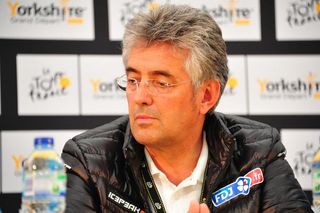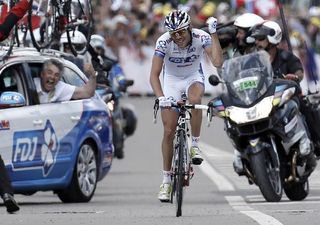20 years of FDJ: Marc Madiot looks back on the 'fairy tale'
'It could have ended quickly but we're still there with bigger hopes than ever'





The following feature forms part of our 'I love the 1990s' series and sees Jean-François Quénet sit down with Marc Madiot to reflect on the history of the FDJ team, which he set up 20 years ago and still manages to this day.
As the FDJ team embarks on its 21st season, its three leaders, Arnaud Démare, French champion Arthur Vichot, and Thibaut Pinot, have already picked up wins at the Etoile de Bessèges, GP La Marseillaise, and Vuelta a Andalucia, respectively. For team manager Marc Madiot, it has been a long journey from the euphoric and chaotic beginning of the squad that bears the four-leafed clover on its jerseys.
Madiot ended his own racing career in 1994, aged 35, after a leg-breaking crash at Paris-Roubaix, a race he won twice (in 1985 and 1991; he also won as an amateur in 1979). But it was no secret in the cycling world that he wanted to create his own team.
“My first concern was to find a sponsor and my second concern was to make the sponsor stay on board as long as possible,” Madiot recalls. “I was in no rush.”
French national lottery La Française des Jeux embraced his project, but it took him two years to get the team off the ground for the 1997 season.
“It was a moment of a big crisis in French professional cycling,” Madiot says. “In 1996, the national championship was open to amateurs because there weren’t enough pros to race - only sixty of them, compared to 160 to 170 nowadays. There was only one team in the first division [Gan]. Young talents had no future. They weren’t even turning pro. A generation had been sacrificed. There was a real need for a new team. The first two riders I signed were 19 years old: Nicolas Vogondy and Damien Nazon.
“Had I been in a situation to recruit young French riders only, I would have done it, but three projects were developed at the same time, with the inception of Cofidis the same year and Casino taking over the title sponsorship of Vincent Lavenu’s team, which had already existed [since 1992 – ed.] but on a smaller scale. So suddenly, instead of building a team in a desert, we found ourselves facing big competition. We were forced to change our mind and recruit mercenaries, which is certainly not the best thing we’ve done in twenty years.”
Get The Leadout Newsletter
The latest race content, interviews, features, reviews and expert buying guides, direct to your inbox!
In his first roster, Madiot gathered the likes of Davide Rebellin, Mauro Gianetti, Max Sciandri and Andrea Peron. “There were very good riders in Italy at the time,” he explains. “Had it been like now, we would have probably been hunting for Anglophone riders instead. We recruited according to supply and demand. There were almost no rider agents, and there was no internet either. I remember hand-writing offers and sending them to the riders by fax.”

La Française des Jeux was not structured like the other teams of that era. “My motto was that the team had to be built to last,” Madiot says. “From my years as a rider, the best organisation I had known was the Renault team, over which the sponsor had control. The car manufacturer was involved in the running of the cycling team. But later on, teams started to belong to the managers: Cyrille Guimard, Roger Legeay, Peter Post, Jan Raas and so on. They were looking for sponsors every year.
“From the different experiences, I became convinced that a company would last longer as a sponsor if it was connected to the cycling team. I was lucky enough that FDJ had a warehouse in the outskirts of Paris that could host our headquarters near Charles de Gaulle airport where some lottery tickets get printed. For more than twenty years, FDJ employees have occasionally shared lunch with the staff of the cycling team with the feeling of belonging to the same organization. Different departments of the FDJ company have contributed to run the cycling team: accounts, legal, human resources, media PR…
“The company holds the majority of the shares of the cycling team, I’m the president of the board but I have only one share. The sponsor knows how every cent is spent. It’s partly a state-owned company, so everything is done according to the rules. We’ve never had a problem with taxation or welfare system payment. In over twenty years, salaries for staff and riders have always been paid on time, except once, I remember, when there was a three-day delay due to a computer bug. Being in the gaming industry and linked to the government, FDJ has also been strongly involved in writing ethical charters and leading the fight against doping.”
A date is fixed in Madiot’s memory: 12 January 1997, when Christophe Mengin won the French championship for cyclo-cross. The following day, at the team’s inaugural launch, three riders lined up with blue-white-red jerseys devoid of any sponsor’s name, as had been the case for national champion's jerseys in the past , and indeed still is at FDJ: Stéphane Heulot (road), Eddy Seigneur (time trial) and Mengin.
“We only won thirteen races the first year,” Madiot continues, “but they were significant: Paris-Roubaix with Frédéric Guesdon, a Tour de France stage with Mengin and two other World Cup events [the Clasica San Sebastian and GP Zurich with Rebellin – ed.] We had a team of snipers. We also had beginner's luck. Paris-Roubaix was a pure fairy tale. Guesdon did the sprint of a lifetime while all of our other riders were out of contention. In the velodrome, he outsprinted no less than Jo Planckaert, Johan Museeuw, Andreï Tchmil, Rolf Sørensen, Frédéric Moncassin… It was surrealistic.”

But the history of the squad didn’t start as an absolute fairy tale. On the eve of Paris-Nice, Erwan Menthéour was one of the first riders denied a start because of a haematocrit level above 50 per cent, which was the first step of the UCI’s fight against the use of EPO. “I had believed I could make a rider of him but I made an error,” says Madiot, who freely admits that Menthéour wasn’t his only mistake in terms of recruitment over the twenty years.
After hiring Evgeni Berzin in 1998, FDJ opted for a strong anti-doping policy following the turmoil of the Festina Affair during the Tour de France. “It could have marked the end of French cycling,” Madiot says. “But all parties decided to stick together: the Ministry of Sport, the French cycling federation, the professional league, the teams, the riders' union… It would have been easier to throw in the towel, but everyone played their part in rebuilding the trust in cycling.
“It didn’t happen in the blink of an eye. Our fight lasted for years, during all of the Lance Armstrong era, even though he was not the only one to ridicule French cycling. It wasn’t easy to motivate our riders to go training and racing while knowing they would have almost no chance [to beat the dopers]. But I’ve been lucky enough to meet great people like Sandy Casar, Bradley McGee and Philippe Gilbert, just to name a few, who once upon a time maintained a glimmer of a hope for everyone with a Tour de France stage win or a Het Volk victory.
“Luckily, Operacion Puerto rang another bell. The biological passport and ADAMS systems were implemented. It enabled us to work properly with a new generation and bring to light the likes of Arnaud Démare, Nacer Bouhanni, Arthur Vichot, Thibaut Pinot, and hopefully the next in line, David Gaudu.”
The names of eventual Grand Tour winners Chris Horner and Bradley Wiggins, who turned pro with FDJ in 1997 and 2002 respectively, don’t spontaneously leap to the top of Madiot’s memory due to the minor impact they had on the history of his team, but one emotion stands out in his mind. On stage 6 of the 2005 Tour de France, early breakaway rider Christophe Mengin was on the verge of winning in his home town of Nancy but crashed on the wet road on the last curve.
“I was knocked out that day,” Madiot says. “All the other disappointments have been attenuated with time, but that one has remained a big pain. Overall, our team’s history is a fairy tale. It could have ended quickly, but twenty years later we’re still there with bigger hopes than ever.”

Thank you for reading 5 articles in the past 30 days*
Join now for unlimited access
Enjoy your first month for just £1 / $1 / €1
*Read any 5 articles for free in each 30-day period, this automatically resets
After your trial you will be billed £4.99 $7.99 €5.99 per month, cancel anytime. Or sign up for one year for just £49 $79 €59

Join now for unlimited access
Try your first month for just £1 / $1 / €1
Most Popular

